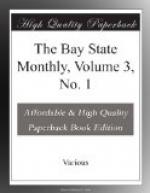There is one state in our Union in which, as one of her Judges puts it, “to her unfading honor,” not a single divorce has been granted for any cause since the Revolution. But the fact remains, not so much to her unfading honor, perhaps, that she has found it necessary to regulate by statute the proportion of his property which a married man may bestow upon his concubine, while at the same time adultery is not an indictable offence. Another of her Judges has said from the bench, “We often see men of excellent characters unfortunate in their marriages, and virtuous women abandoned or driven away houseless by their husbands, who would be doomed to celibacy and solitude if they did not form connections which the law does not allow, and who make excellent husbands and wives still.”
This judicial utterance makes an excellent basis for the statement that it is better to adapt the law to facts as we find them, than to proceed on the principle that as there is no redress called for save where there is a wrong, if we do not allow the redress, there will, of course, be no wrong. There is no escape from the conclusion that divorce or irregular connections will prevail in every community; why not agree with Milton that honest liberty is the greatest foe to dishonest license?
When the founders of the new Commonwealth came to these shores they brought with them of necessity the laws of the mother country, and so we shall find that the divorce laws of England, as they existed at that time, were the early laws of the colonies of Plymouth and Massachusetts Bay. The Ecclesiastical courts of England were invested with full jurisdiction of all matters of divorce, but from about the year 1601 they had steadily refused to grant an absolute divorce for any cause whatever, although they as constantly granted divorce from bed and board, allusion to which has already been made; that is, they decreed a judicial separation of man and wife, which freed the parties from the society of each other, but at the same time left upon them all the obligations of the marriage vow as to third parties. Finally, when divorce was sought for cause of adultery, resort was had to parliament, and in 1669 an absolute divorce for that cause was granted by that body for the first time. This mode of procedure was, of course, a most expensive one, and during the seventeenth century but three decrees absolute were granted, the parties in each belonging to the peerage and the cause being the same.
In cases arising in the early history of the colonies we should therefore expect to find the law as I have briefly sketched it as existing in England, and as there were then no courts exercising the functions of the Ecclesiastical Courts we might safely look for the exercise of these powers by the Court of Deputies, or General Court, which was at that time not simply a deliberative body, but also a court of most extensive and varied jurisdiction, in matters both civil and




